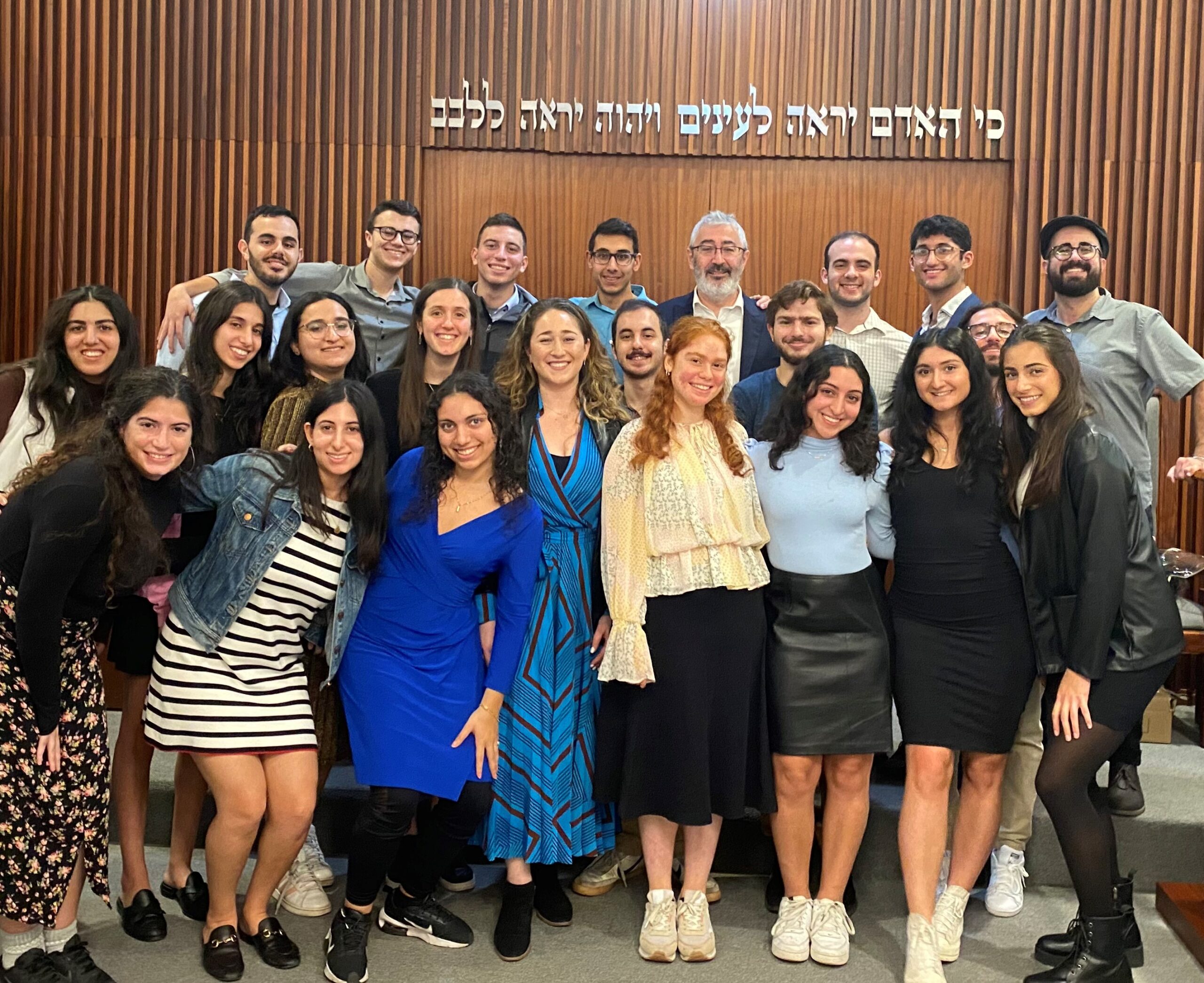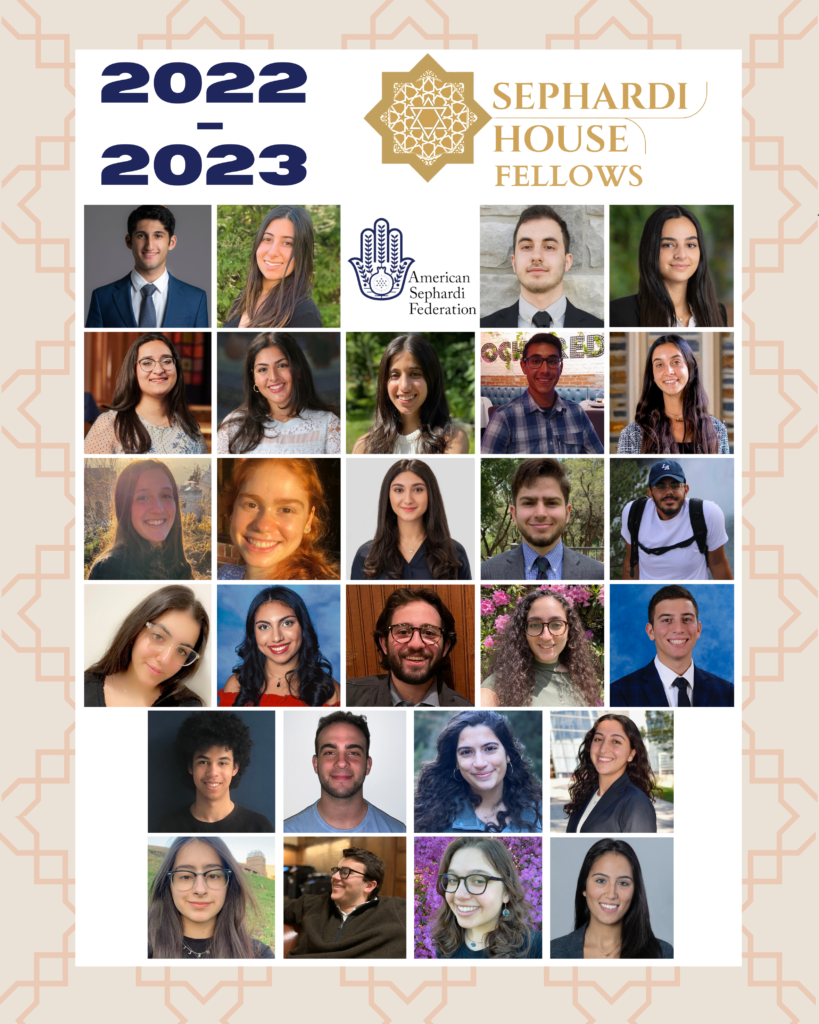Announcing the ASF’s 2022-2023 Sephardi House Fellows

- >The Sephardi House Fellowship is the only yearlong program of its kind that infuses the wisdom, diversity, creativity, and warmth of the Sephardic spirit into Jewish campus life.
- >27 new Sephardi House Fellows on campuses nationwide, including Harvard, UPenn, UT Austin, UCLA, Cornell.
- >58 Sephardi House Fellows since 2020.
(New York, NY) 3/6/23: On a brisk Sunday morning at the Moise Safra Center on the Upper East Side, over two dozen college student leaders from across the United States gathered to reflect on a weekend of learning, community building, and Jewish pride–a weekend that included Shabbat meals and learning sessions at Congregation Magen David of Manhattan, a tour of the historic Kehila Kedosha Janina Synagogue and the Center for Jewish History, and a rooftop Havdalah celebration at the home of ASF Young Leaders Ezra and Michelle Mosseri. “I met the most amazing and inspiring people, all while deepening my knowledge of the extensive Sephardi history in Manhattan and around the world,” said Emuna Rouhani of Cornell University. Elijah Kahlenberg, a sophomore at University of Texas at Austin, added, “what I respect most about how [Sephardi House] structured the Shabbaton was that, while we were a cohort, it still felt so personalized, like our own individual stories were finally being heard.”
These 27 exceptional students represent the third cohort of the American Sephardi Federation’s Sephardi House Fellowship. Founded in 2020, Sephardi House is a national movement that is infusing the wisdom, diversity, vibrancy, and warmth of the Sephardic spirit into Jewish student life—while also advancing Jewish unity, vitality, and pride on campus. A core component of Sephardi House is its premier fellowship—a year-long learning, leadership development, and enrichment experience that immerses students in the multifaceted history, cultures, and intellectual legacy of the Greater Sephardic and Mizrahi world.
Sephardi House’s mission and growth from 13 to 18 to 27 students is especially critical given the proliferation of antisemitism, BDS, isolation, and divisive ideologies on campus. We are pushing back with a nationwide movement that celebrates Jewish diversity, cultivates Jewish unity and continuity, and deepens a love of the Jewish People and Israel. Our aim is to simultaneously empower underrepresented Jewish students, imbue Sephardic soul into campus life, champion Jewish values, and bring all Jewish students together.

Support Jewish unity and diversity on campus, as well as the future generation of leaders in the Greater Sephardi world:
Sephardi House is led by Joshua Benaim—a real estate entrepreneur, Harvard Business School alumnus, and opera singer of Sephardic Moroccan, Persian, and Ashkenazi origin—and Ruben Shimonov, a noted Bukharian Jewish educational leader. Motivated by a love of Jewish heritage and the rise in reductive narratives and antisemitic tropes that are sadly too common on campus today, Benaim joined with Jason Guberman of the American Sephardi Federation and Shimonov to craft a program that would fortify students with the deep knowledge of the Jewish tradition, inspire them, and cultivate the next generation of young Jewish leadership.
“It’s one thing to lament the disturbing rise of antisemitism on campus. It’s another thing to do something about it. We need all hands on deck to support our young people.” said Sephardi House Founder Joshua Benaim. “The students are thirsty for knowledge and authentic Jewish connection. These are the superpowers that have kept the Jewish people strong for millennia. The sight of these proud and talented students flourishing with Sephardi House gives one hope for our future on campus.”
“The Sephardi House fellowship gave me the opportunity to imagine the future of Sephardic Jewry by studying its past, engaging with thoughtful peers and leaders [and] really feeling the Sephardic ideal in action,” said 2021-22 Sephardi House Fellow Yosef Malka of Yale University. Reflecting on her fellowship experience last year, Asia Akperov, of Hunter College, shared, “I feel so grateful to have received the opportunity to take part in this fellowship where we gained everything that is needed to be a part of the next generation of Sephardi leaders who will ensure that our culture and traditions live on.”
Sephardi House is comprised of the following components: 1) 10 cohort-based learning and discussion sessions with influential Jewish educators, community and industry leaders, scholars, and artists, 2) one-on-one mentorship and tailored campus support, 3) access to the American Sephardi Federation’s robust educational and community resources, 4) an in-person Shabbaton leadership summit, and 5) a capstone community-building project that invites fellows to imbue the Sephardic spirit and their unique voices into Jewish student life. Through their own community projects and leadership on campus—including Jewish learning, Shabbat dinners, cultural events, and holiday programming—the students have engaged hundreds of their peers.
Since its inception in 2020, the fellowship has engaged nearly 60 student leaders from colleges such as Stanford, Columbia, Brown, Duke, University of Maryland, Rutgers, Georgetown, UCLA, Syracuse, CUNY, SUNY Binghamton, and University of Pittsburgh. Representing communities of an array of Jewish backgrounds—including Greek, Iraqi, Bukharian, Kavkazi, Moroccan, Tunisian, Egyptian, Persian, Turkish, Syrian, and Yemenite—they are an exceptionally diverse group that are continuing to make their mark on Jewish campus life.
“The Sephardi House Fellowship introduced me to the vastness of the Sephardic-Mizrahi community. I was able to explore my own heritage while learning about the interconnectedness of a larger Jewish community,” expressed 2021-22 Sephardi House Fellow Jessica Yeroshalmi, who is now President of Baruch College Hillel. Echoing these sentiments, Elizabeth Danon of Georgetown University said that “The Sephardi House Fellowship is truly an amazing opportunity for the greater Sephardic world…[it] not only taught us the full breadth of Sephardic and Mizrahi history but gave us the tools to become leaders in our community.”
Fellows engage in a deep exploration of often overlooked Jewish experiences—including the poetry and philosophy of medieval Spain, Ladino music of the Balkans, Judeo-Persian and Judeo-Arabic literature, the wisdom of Sephardic sages in the Land of Israel, the inclusive and tolerant teachings of Classic Sephardi Judaism, and experiences of Middle Eastern and North African Jewish refugees in the 20th century.
“This year, we had an overwhelming number of students apply to the fellowship, which indicates the necessity of our work with college students,” said Ruben Simonov, National Director of Sephardi House. “We are excited to meet this need and grow our movement by supporting our largest cohort thus far. With joy and a sense of urgency, we are using this critical moment on college campuses across the nation to elevate and celebrate the vibrancy, diversity, and richness of the Greater Sephardic and Mizrahi world, and the Jewish People more broadly.”
With great enthusiasm, please welcome our cohort of 27 college students who have been serving as the ASF Sephardi House Fellows for the 2022-2023 academic year!
Abigail Rabbany, Hofstra University
Alexandra Ahdoot, Duke University
Anaelle Small, Brandeis University
Arielle Cohen, Rutgers University
Bella Iskhakov, Queens College
Elijah Kahlenberg, University of Texas at Austin
Emily Silverstein, Barnard College of Columbia University
Emuna Rouhani, Cornell University
Eric Kalimi, Harvard University
Gaden Romer, Brown University
Itai Savin, Columbia University
Jacob Kohanim, Baruch College
Julia Nazarieh, Hunter College
Justin Cohen, University of Pittsburgh
Morris Hakim, University of Pennsylvania
Netanel Schwartz, Yale University
Nora Monasheri, SUNY Binghamton
Ori Amiel, University of Maryland
Rebecca Graham, University of Vermont
Sahar Tartak, Yale University
Serena Eshagoff, Tulane University
Shani Avshalomov, San Diego State University
Shannon Saed, The Sophie Davis Biomedical Education Program at The City College of New York
Tal Israeli, University of California, Los Angeles
Tal Kalderon, Virginia Polytechnic Institute and State University
Talia Dror, Cornell University
Tanya Abergel, Cornell University